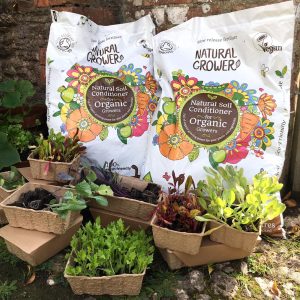This is a guest post from our friends at Natural Grower, a wonderful company that offers award-winning, approved organic and peat-free compost that will give your soil and your plants some seriously good growing power.
Focusing on soil health when you’re growing your own food is not only beneficial for your herbs and veg plants but it also contributes to the overall structure and well-being of your garden’s soil ecosystem.
Here are eight practices that will help you to look after your soil over this coming growing season:
1- Get to Know Your Soil:
Regular observation and soil testing will give you a deeper understanding of your soil so that you can work to improve it.
Regularly test your soil to understand its nutrient levels and pH. Soil testing guides you in making informed decisions about fertilization and soil amendments. You can purchase basic soil testing kits online. If you want a more detailed analysis, you can send samples off to a lab to be tested.
Observe your garden regularly for signs of pests, diseases, or nutrient deficiencies. Early detection allows for prompt and targeted interventions. Slugs and snails will always be spotted on a daily basis. Ants also work alongside Blackfly, so if you see ants making their way up your bean plants, the blackfly will soon follow them!
2- Avoid Using Chemicals:
Over-reliance on synthetic fertilizers, pesticides, and herbicides disrupts the natural balance of the soil ecosystem and they should be avoided. Organic fertilisers, on the other hand, nourish the soil. In turn, the richer soil feeds your vegetable plants. Chemical fertilisers and pesticides/herbicides may seem to provide a quick fix, but they provide no long term benefits to the plants, the soil or the eco-system living in it. Instead, choose slow-release, natural fertilisers that will work with this delicate eco-system to keep your soil in optimum condition. Natural Grower approved organic liquid feed and soil conditioning feed provide all the nutrients your soil and plants will need, and Rocket Gardens’ worm cast fertiliser is a good choice too.
3- Add Organic Matter and Compost:

Amend the soil with organic matter such as compost or soil conditioner. Organic matter improves soil structure, water retention, and nutrient availability. Be careful adding horse manure, as it can be contaminated with Aminopyralid if the horses have grazed grass or eaten hay which has been treated with the herbicide (which is used for broadleaf weeds). Aminopyralid poisoning will stunt the growth of your plants and it takes a long time to remove from contaminated soil.
Start a compost pile to recycle kitchen and garden waste. Compost is a rich source of organic matter that improves soil structure and provides essential nutrients. If you don’t have space to make your own compost pile, invest in good quality approved organic compost that is peat-free and green-waste free. Cheap compost that contains green-waste will add plastics and possible chemical pollutants to your soil, so it’s worth investing in the best compost you can afford.
4- Choose a No-Dig Approach:
Minimize soil disturbance by adopting a no-dig or low-dig gardening approach. This helps preserve soil structure and benefits the microorganisms that are present in the soil. Rocket Gardens has plenty of information on no-dig gardening, so have a hunt through their other blog posts and growing advice.
5- Encourage Beneficial Insects and Microorganisms:
Encourage beneficial insects and microorganisms in your garden. For example, ladybirds, earthworms, and mycorrhizal fungi play crucial roles in maintaining soil health. Our Natural Grower plant feed and soil conditioner contains beneficial natural fungi, and the earthworms work this soil improver down into the soil. As the earthworms eat the soil improver their digestive system concentrates the organic and mineral constituents, resulting in their casts being richer in available nutrients than the soil around them.
Include a variety of plants in your garden to promote biodiversity. Diverse plantings support a range of soil organisms and contribute to a more resilient ecosystem. In addition to growing vegetable plants, try growing flowering plants, herbs, companions, wildflowers and other edibles. The wider the range, the better. Your garden will really thank you for it.
6- Apply an Organic Mulch in Autumn:
Apply an organic mulch around plants to help retain soil moisture, suppresses weeds, and regulates soil temperature. You could use something like Natural Grower’s compost or soil conditioner, or straw, leaves, or wood chips around plants. The best time to mulch around your plants and over empty beds is in the Autumn. This gives the organisms living in your soil (worms etc), a chance to break the mulch down and incorporate it into the soil, ready to provide perfect growing conditions in the Spring and Summer.
7- Grow Cover Cropping Over Winter:
Plant cover crops, also known as Green Manure crops, during the off-season or in areas where plants are not actively growing. Cover crops help to protect the soil from erosion, and they add organic matter and enhance nutrient cycling. Choose crops like Forage Pea, Forage Rye and Field Beans and cut them down just before they flower. They can then add additional organic matter to your soil.
8-Practice Crop Rotation:
Practicing crop rotation, especially in a larger plot with several beds like an allotment, can help to prevent the build-up of pests and diseases. Rotating crops also helps to maintain a more balanced soil ecosystem which reduces the risk of soil-borne pathogens. An easy way to get started is to start with legumes (beans and peas) in a bed during the first year, then grow salads or brassicas in it in the second year, fruiting crops like tomatoes, sweetcorn and aubergine the following year and root vegetables in the final fourth year. Then you start all over again.
By adopting these soil-friendly gardening practices, you will start to see improvements in the long-term health and sustainability of the soil in your garden, and you should soon notice this in the plants themselves through healthier leaves, stronger growth and fewer pests and diseases.
